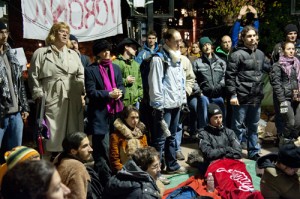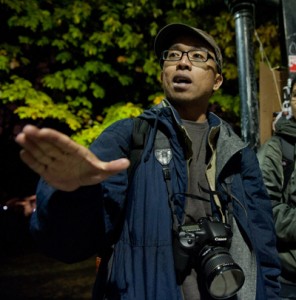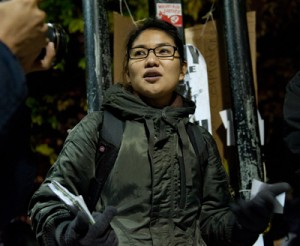How Canada’s 1% plunders PH
How Canada’s 1% plunders PH
Anakbayan leaders speak at Occupy Toronto
By Joseph Smooke
Two Filipino-Canadians succeeded in bringing light to a dark evening for the General Assembly of Occupy Toronto.
Nearly 100 people huddled under the gazebo in soggy St. James Park as the General Assembly of Occupy Toronto became mired in issues of oppression and logistics. As participants struggled Tuesday (Oct. 25) night to relate to each other as activists, and to define their roles in this international movement, Alex Felipe and Mithi Esguerra of Anakbayan Toronto inspired the crowd, and provoked the loudest cheers of the evening.
“We need to start connecting the groups who are willing to stand up and do something”, says Ryan, an environmental activist who lives at the Occupy Toronto camp part time. Ryan wants Anakbayan’s message to wake people up from their apathy and ignorance about the environmental devastation caused by mining.
Ryan is realistic about the group’s lack of focus. He observes that “there are so many issues, and we are also still establishing the community itself. Our biggest situation right now is establishing an all-inclusive community.”
Felipe and Esguerra had hoped to present a workshop called “Canada and the Philippines: Corporate Greed, Human Rights, and Migration”, but the General Assembly was not yet ready to receive the entire presentation. Felipe and Esguerra were still able to tell those gathered that Canadian mining interests dominating the Toronto Stock Exchange have a profound impact on life in the Philippines causing displacement, poverty, and migration with many of those migrants ending up in Canada.
“You may or may not know that the Philippines since 2007 has been the largest supplier of migrants, mostly temporary workers to Canada,” Felipe informed the Assembly. “You can see a lot of us here working as nannies, working in fast food joints, working in factories, and hotels.”
The mainstream press has characterized the Canadian version of the international Occupy movement as being insubstantial. Income disparities in Canada are not as extreme as in the U.S., Canadian banks have not received bailout funds from the government, and the government here is not drowning in debt. Although it certainly has not yet found its voice, the Occupy Toronto camp has a robust infrastructure with working committees, a General Assembly, 244 tents, a growing library of donated books, a website featuring live video streaming, and plans for solar power to provide heat once the inevitable winter snows descend on the camp.
Johnny Dib, a Lebanese Canadian who spends as much time as he can at the camp observed that “because Wall Street became such a symbol for the Occupy movement everyone thinks it’s only a financial issue or something to do with the banks, but really it’s very much beyond that.”
Esguerra provided context to the largely non-Filipino crowd, “the Philippines is one of the so-called Third World countries and it has this long history of colonization,” but the Philippines also has a long history of effective activism. She talked about a bill proposed in the Philippine legislature that will allow 100 per cent foreign ownership of Philippine lands. “If this bill is passed into legislation, these foreign mining companies from Japan, from Australia, from Canada will reap even more profits from the Philippines — from the Filipino people.”
In true Filipino spirit, Esguerra inspired the crowd by describing that “last week the farmers from different provinces have marched from their provinces to Manila to protest this proposed bill, and there are also occupations in different locales in the Philippines. There’s one in the business district, there’s one in the bridge leading to the Presidential Palace, and there are also some in different universities across the country. So the movement is growing”.
The danger is not just from Canadian ownership of land in the Philippines. There is a long history tying Canada to the Philippines especially through mining and industry. Felipe told the crowd that “the invasion of the Philippines was facilitated by Canadian mining in Sudbury which re-armed the American fleets which took over the Philippines” at the turn of the 20th century during the Philippine American War.
“What’s happening right now is that 75 per cent of the world’s mining companies are traded right here out of the Toronto Stock Exchange,” Felipe said. Colonialization continues as corporations gain more rights at the expense of people on both sides of the Pacific Ocean, he continued. Canadian tax dollars feed an infrastructure that directly fuels Canadian mining corporations, and as Felipe said, “whether or not Canadians realize it, we’re actually paying for the plunder of the Philippines and this benefits Canada, but not all Canadians. It really benefits only a small segment of Canada.”
“A lot of people still think that America is worse off and that Canada is all right,” said Dib in an interview after hearing the speakers. “Our economy is based on something unethical which is extracting natural resources and making profits out of them.”
Signifying that Occupy Toronto might be finding its voice, Matt, one of the Occupy Toronto participants received unanimous support to bring his proposal to the Action Committee to “once a week bring the General Assembly out somewhere else in the community.” And, Esguerra asserts “We’ll keep coming back here. We’ll still try to do the workshop as part of the Occupy Toronto Free School.” They will also be holding similar workshops and discussions through Anakbayan Toronto, because Occupy Toronto is just one part of the networks of activism that are necessary to impact such large issues.






Comments (0)